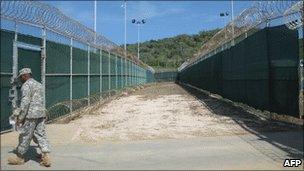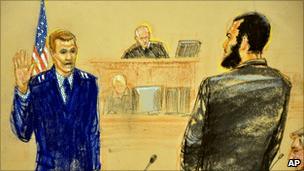Q&A: Closing Guantanamo
- Published

The Guantanamo Bay facility was opened following the US-led invasion of Afghanistan in 2001
US President Barack Obama was unable to close the prison camp at Guantanamo Bay in Cuba by 22 January 2010, as he had intended.
Guantanamo has held some 775 inmates who have been accused of links to al-Qaeda or the Taliban. Many have been freed or transferred to foreign governments, and five have been convicted by military tribunals, leaving a reported 170 or so still in custody there.
In mid-December 2009, Mr Obama ordered the preparation of a federal facility in Thomson, Illinois, to receive prisoners from Guantanamo. However, Congress has not provided funding for this.
A month earlier, US Attorney General Eric Holder had said the alleged mastermind of the 9/11 attacks, Khalid Sheikh Mohammed, and four others would face a civilian trial in New York, but this has since been put in doubt.
Why the delay on closure?
Bipartisan opposition to the transfer of Guantanamo prisoners to the US has grown. Congress has not authorised funding for transfers and Mr Holder said in April 2010 that Guantanamo could not close without it.
Some prisoners are considered too dangerous to be released, yet the US holds no evidence that can be used in civilian or military trials against them.
How many prisoners face indefinite detention without trial?
A committee convened by Mr Obama determined in January that 48 prisoners were too dangerous to transfer but could not feasibly be prosecuted.
What about the rest?

Omar Khadr (right) pleaded guilty to five charges including murder before a Guantanamo Bay tribunal
Of the rest, a large portion have been cleared for release but have nowhere to go. The US fears some would face torture in their home countries but cannot find another country to receive them.
Meanwhile, in January 2010 Mr Obama suspended the release of prisoners from Yemen to that country, citing security concerns.
Five prisoners, including Canadian Omar Khadr, have been convicted in military tribunals held at Guantanamo Bay. Two of those served short sentences and returned home to Australia and Yemen, and two others are serving sentences at Guantanamo Bay.
What about trials in normal civilian courts?
Six prisoners were approved for trial in civilian courts, including the alleged leaders of the 9/11 attacks.
The first trial has now taken place, in New York City. In it, Ahmed Khalfan Ghailani was convicted of only one count of 285 for his role in the 1998 bombings of US embassies in east Africa. The judge excluded much of the evidence against him because it was held to have been obtained by coercive methods.
The result is being seen as a blow to President Obama's hopes of using the civilian courts for other trials. The likely result is that there will be a mix of trials, military tribunals and continuing detentions.
So when will Guantanamo be closed?
This is unclear. The issue was not widely debated during the mid-term elections and Mr Obama has largely ceased to push for closure in public.
What about the 9/11 trial?
Mr Obama has been determined to shift the balance where possible from military tribunals to civilian courts and this trial in itself was seen as a major step towards closing the camp. The plan was to have the trial of the main alleged conspirators take place in New York City, close to the scene of the 9/11 attacks, but local objections, largely on grounds of security, have forced a rethink. Moving the trial somewhere else is possible; another option is to hold a military tribunal.
Will a fair civilian trial be possible?
The procedure would be the same as for any other civilian trial, though parts of it might be closed when secret information is being presented. The trial would be different from the military tribunal the defendants had faced. There would be a civilian jury which has to decide the issues unanimously, and defence lawyers would have greater scope to challenge any confession that might have been based on waterboarding.
The result of the Ghailani case was hailed by some as a vindication of the civilian system but by others as a threat to US security.
What might the penalty be if a guilty verdict is returned in the 9/11 case?
The attorney general said he would seek the death penalty, which is allowed in a federal court.
Will military tribunals continue?
Yes, because the task force looking into this says the "realities of the battlefield" might prevent the normal collection of evidence. Soldiers could not, for example, be expected to read a captured prisoner his rights, something required in civilian cases. Intelligence sources might also have to be protected.
How have the reports of Guantanamo's planned closure been received?
Some relatives of the 9/11 victims are opposed to the camp's closure, believing that it is a secure location to try terror suspects.
Human rights groups have broadly welcomed the move. However, some activists and lawyers have expressed concern about how long it is taking to close Guantanamo, and that some form of military tribunal or even indefinite detention will continue.